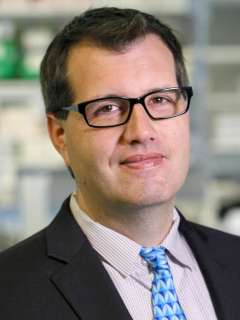
Paul Spellman , PhD
Languages
Education
Fellowship
Degrees
Contact Information
Scientific Interests
Dr. Spellman works to apply genomic and computational technologies to improve human health with a primary emphasis on improving outcomes for people with cancer. The work in his lab works at all phases from technology/method development, to application of technologies to answer critical questions in cancer biology, to population studies to understand the impact of genetic variation of disease, and to implementation trials that directly impact health. Current funded research focuses on systematic analysis of genetic and gene regulation information in clinical cohorts as part of the Genome Data Analysis Network and a clinical trial implementing genetic health screening for hereditary breast and ovarian cancer and Lynch syndromes. Other areas of interest include polygenic risk implementation and modeling, precision medicine, and understanding the molecular biology of cellular replication.
Highlighted Publications
Population screening shows risk of inherited cancer and familial hypercholesterolemia in Oregon. O'Brien TD, Potter AB, Driscoll CC, Goh G, Letaw JH, McCabe S, Thanner J, Kulkarni A, Wong R, Medica S, Week T, Buitrago J, Larson A, Camacho KJ, Brown K, Crist R, Conrad C, Evans-Dutson S, Lutz R, Mitchell A, Anur P, Serrato V, Shafer A, Marriott LK, Hamman KJ, Mulford A, Wiszniewski W, Sampson JE, Adey A, O'Roak BJ, Harrington CA, Shannon J, Spellman PT, Richards CS. Am J Hum Genet. 2023 Jul 12:S0002-9297(23)00239-2. doi: 10.1016/j.ajhg.2023.06.014. Online ahead of print. PMID: 37506692
Characterizing genetic intra-tumor heterogeneity across 2,658 human cancer genomes. Dentro SC, Leshchiner I, Haase K, Tarabichi M, Wintersinger J, Deshwar AG, Yu K, Rubanova Y, Macintyre G, Demeulemeester J, Vázquez-García I, Kleinheinz K, Livitz DG, Malikic S, Donmez N, Sengupta S, Anur P, Jolly C, Cmero M, Rosebrock D, Schumacher SE, Fan Y, Fittall M, Drews RM, Yao X, Watkins TBK, Lee J, Schlesner M, Zhu H, Adams DJ, McGranahan N, Swanton C, Getz G, Boutros PC, Imielinski M, Beroukhim R, Sahinalp SC, Ji Y, Peifer M, Martincorena I, Markowetz F, Mustonen V, Yuan K, Gerstung M, Spellman PT, Wang W, Morris QD, Wedge DC, Van Loo P; PCAWG Evolution and Heterogeneity Working Group and the PCAWG Consortium. Cell. 2021 Apr 15;184(8):2239- 2254.e39. doi: 10.1016/j.cell.2021.03.009. Epub 2021 Apr 7. PMID: 33831375.
Epigenetic loss of heterogeneity from low to high grade localized prostate tumours. Eksi SE, Chitsazan A, Sayar Z, Thomas GV, Fields AJ, Kopp RP, Spellman PT, Adey AC. Nat Commun. 2021 Dec 15;12(1):7292. doi: 10.1038/s41467-021-27615-8. PMID: 34911933.
Epigenetic control of chromosome-associated lncRNA genes essential for replication and stability. Heskett MB, Vouzas AE, Smith LG, Yates PA, Boniface C, Bouhassira EE, Spellman PT, Gilbert DM, Thayer MJ. Nat Commun. 2022 Oct 22;13(1):6301. doi: 10.1038/s41467-022-34099-7. PMID: 36273230.
An open protocol for modeling T Cell Clonotype repertoires using TCRβ CDR3 sequences. Gurun B, Horton W, Murugan D, Zhu B, Leyshock P, Kumar S, Byrne KT, Vonderheide RH, Margolin AA, Mori M, Spellman PT, Coussens LM, Speed TP. BMC Genomics. 2023 Jun 26;24(1):349. doi: 10.1186/s12864-023-09424-z. PMID: 37365517.
